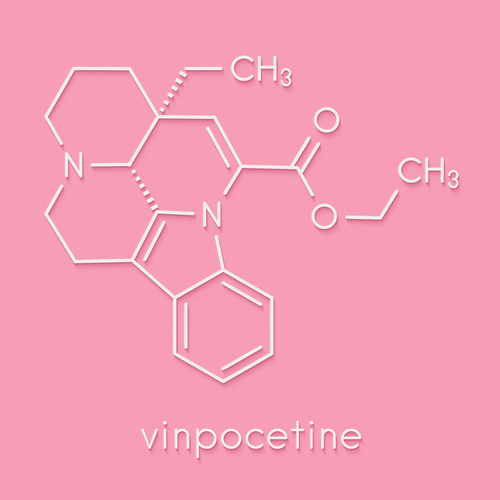Monographs licensed from Therapeutic Research Center, LLC
Scientific names: Eburnamenine-14-carboxylic acid, Ethyl Ester
Alternate names: AY-27255, Cavinton, Common Periwinkle Extract, Common Periwinkle Vinpocetine, Eburnamenine-14-Carboxylic Acid, Ethyl Apovincaminate, Ethylapovincaminoate, Lesser Periwinkle Extract, RGH-4405, TCV-3b, Vinca Minor Extract, Vinpocetin, Vinpocetina, Vinpocétine
Actions: Antihypoxia, Antioxidant, Cerebral blood flow, Ejaculation, Hematologic, Immune, Ion channel, Memory enhancement, Neuroprotective, Ophthalmic, Otic, Phosphodiesterase-1 inhibition, Platelet, Urinary
Scientific names: Eburnamenine-14-carboxylic acid, Ethyl Ester
Alternate names: AY-27255, Cavinton, Common Periwinkle Extract, Common Periwinkle Vinpocetine, Eburnamenine-14-Carboxylic Acid, Ethyl Apovincaminate, Ethylapovincaminoate, Lesser Periwinkle Extract, RGH-4405, TCV-3b, Vinca Minor Extract, Vinpocetin, Vinpocetina, Vinpocétine
Actions: Antihypoxia, Antioxidant, Cerebral blood flow, Ejaculation, Hematologic, Immune, Ion channel, Memory enhancement, Neuroprotective, Ophthalmic, Otic, Phosphodiesterase-1 inhibition, Platelet, Urinary
Vinpocetine is a man-made chemical similar to a substance found in the periwinkle plant (Vinca minor). In Europe, it's sold as a drug called Cavinton.
Vinpocetine might increase blood flow to the brain and protect brain cells (neurons) against injury.
People use vinpocetine for memory, dementia, stroke, hearing loss, and many other conditions, but there is no good scientific evidence to support most of these uses.
In the US, vinpocetine is allowed to be included in dietary supplements, but its status is controversial and may change. The FDA has yet to make a final ruling. In 2019, the FDA issued a warning for those who are pregnant or may become pregnant to avoid vinpocetine due to safety concerns.
When taken by mouth: Vinpocetine is possibly safe for most people when used appropriately for up to one year. It can cause some side effects including anxiety, stomach discomfort, sleep problems, headache, dizziness, and flushing of the face.
Special Precautions & Warnings:
Pregnancy: Vinpocetine is possibly unsafe when used during pregnancy or by those who may become pregnant. Vinpocetine might increase the risk of miscarriage and might cause harm to the fetus. Avoid using.
Breast-feeding: There isn't enough reliable information to know if vinpocetine is safe to use when breast-feeding. Stay on the safe side and avoid use.
Bleeding disorders: Vinpocetine might increase the risk of bleeding. Use cautiously if you have a bleeding disorder.
Weakened immune system: Vinpocetine might weaken the immune system in some people. This might reduce the body's ability to fight infections. If you already have a weakened immune system, check with your healthcare provider before using vinpocetine.
Surgery: Vinpocetine might slow blood clotting. This might increase the risk of bleeding during and after surgery. Stop using vinpocetine at least 2 weeks before you are scheduled for surgery.
NatMed Pro rates effectiveness based on scientific evidence according to the following scale: Effective, Likely Effective, Possibly Effective, Possibly Ineffective, Likely Ineffective, Ineffective, and Insufficient Evidence to Rate.
- Diseases, such as Alzheimer's disease, that interfere with thinking (dementia). Taking vinpocetine by mouth for up to 4 months might slightly improve thinking skills in people with dementia. But it's not clear if it helps long-term.
There is interest in using vinpocetine for a number of other purposes, but there isn't enough reliable information to say whether it might be helpful.
Vinpocetine has most often been used by adults in doses of 10 mg two or three times daily by mouth for up to 4 months. Speak with a healthcare provider to find out what dose might be best for a specific condition.
Interactions with pharmaceuticals
Medications changed by the liver (Cytochrome P450 2C9 (CYP2C9) substrates)
Interaction Rating=Moderate Be cautious with this combination.
Some medications are changed and broken down by the liver. Vinpocetine might change how quickly the liver breaks down these medications. This could change the effects and side effects of these medications.
Medications that slow blood clotting (Anticoagulant / Antiplatelet drugs)
Interaction Rating=Moderate Be cautious with this combination.
Vinpocetine might slow blood clotting. Taking vinpocetine along with medications that also slow blood clotting might increase the risk of bruising and bleeding.
Warfarin (Coumadin)
Interaction Rating=Minor Be watchful with this combination.
Warfarin is used to slow blood clotting. Vinpocetine might increase how long warfarin is in the body, and increase the chances of bruising and bleeding. Be sure to have your blood checked regularly. The dose of your warfarin might need to be changed.
Interactions with herbs & supplements
Herbs and supplements that might slow blood clotting: Vinpocetine might slow blood clotting and increase the risk of bleeding. Taking it with other supplements with similar effects might increase the risk of bleeding in some people. Examples of supplements with this effect include garlic, ginger, ginkgo, nattokinase, and Panax ginseng.
Taking vinpocetine with food might help the body absorb it better.
vital.ly has licensed monographs from TRC Healthcare.
This monograph was last reviewed on 16/11/2023 11:00:00 and last updated on 11/11/2014 19:38:16. Monographs are reviewed and/or updated multiple times per month and at least once per year.
Natural Medicines disclaims any responsibility related to medical consequences of using any medical product. Effort is made to ensure that the information contained in this monograph is accurate at the time it was published. Consumers and medical professionals who consult this monograph are cautioned that any medical or product related decision is the sole responsibility of the consumer and/or the health care professional. A legal License Agreement sets limitations on downloading, storing, or printing content from this Database. No reproduction of this monograph or any content from this Database is permitted without written permission from the publisher. It is unlawful to download, store, or distribute content from this site.
Natural Medicines rates safety based on scientific evidence according to the following scale: Likely Safe, Possibly Safe, Possibly Unsafe, Likely Unsafe, Unsafe, and Insufficient Evidence to Rate. For more information about Natural Medicines’ Safety Rating System,
click here.
The Natural Medicines Effectiveness Ratings are assigned for specific indications. A product might be rated "Possibly Effective" for one condition, but be rated "Likely Ineffective" for another condition, depending on the evidence. For more info
click here.





